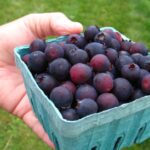Welcome, pet parents, to another edition of our comprehensive blog series exploring the dos and don’ts of your dog’s diet. Today, we venture into a uniquely Canadian topic: “Can Dogs Eat Saskatoon Berries?” The saskatoon berry, also known as the serviceberry, juneberry, or shadbush, is a nutritious North American superfruit that humans adore. But how about our furry friends? Let’s find out.
In our two-part journey, we’ll delve into the science, weigh the pros and cons, and provide useful tips. We aim to clarify your doubts, ensure your dog’s well-being, and transform you into a savvy canine nutrition guru.
The Allure of Saskatoon Berries
Saskatoon berries are no ordinary fruit. They’ve been a part of indigenous diets for centuries, with many tribes using them for medicinal purposes. These berries are packed with nutritional benefits for us humans, but what about for dogs?
The saskatoon berry is a powerhouse of antioxidants, fiber, and essential nutrients like vitamin C, manganese, and magnesium. As we delve deeper, we’ll assess how these nutrients impact our pets’ health and whether they make the saskatoon berry an appropriate treat.
Dietary Requirements
Before diving into the specifics of saskatoon berries, let’s understand a dog’s dietary needs. Unlike humans, they are primarily carnivores, with their diet historically consisting of more proteins and fats and less fruit and vegetables. This doesn’t mean they can’t consume these foods, but moderation is key.
While fruits and veggies can provide dogs with added nutrients, they are not essential. As carnivores, dogs obtain most of their nutrients from meat. That said, fruits like saskatoon berries could offer extra health benefits if incorporated in small quantities.
Saskatoon Berries and Dogs: A Nutritional Perspective

So, the burning question is, can dogs benefit from the nutritional goodness of saskatoon berries? To put it simply, yes. Despite their primarily carnivorous diet, dogs can still reap the rewards of the berry’s nutritional content.
For instance, the antioxidants present can help fight off harmful free radicals in your dog’s body, while fiber aids digestion. Vitamin C is beneficial for your pet’s’ immunity, and minerals like manganese and magnesium contribute to bone health and metabolic function.
Potential Risks of Saskatoon Berries
However, it’s not all sunshine and rainbows. While the benefits are clear, there are some potential risks to consider. Dogs have a different metabolic system than humans, which means they might react differently to certain substances found in saskatoon berries.
Excessive fiber intake, for instance, may cause digestive issues in dogs, like gas, bloating, or diarrhea. Similarly, high sugar content, which is common in many fruits, could lead to weight gain or dental issues if consumed in large quantities. It’s essential to remember that moderation is key.
How to Serve Saskatoon Berries

If you’ve decided to introduce saskatoon berries into your dog’s diet, it’s crucial to do so carefully. Start with small quantities and observe your pet for any adverse reactions.
Dogs can eat saskatoon berries both fresh and dried, but avoid feeding them any canned or syrupy versions, which may contain harmful additives or excessive sugar. Always remember to wash the berries thoroughly before serving to remove any pesticides.
Alternatives to Saskatoon Berries
If you can’t find Saskatoon berries or your dog doesn’t fancy them, don’t fret. There are other dog-friendly fruits that can provide similar nutritional benefits.
- Blueberries are packed with antioxidants and vitamin C.
- Apples (minus the seeds and core) are a source of vitamins A and C, as well as fiber.
- Watermelon, without seeds or rind, provides hydration and vitamins A, B6, and C.
Watch Out for Allergies
Just like humans, dogs can also be allergic to certain foods, and berries are no exception. Signs of food allergies can range from mild to severe.
Common symptoms include itchiness, hives, swelling of the face, ears, lips, eyelids, or earflaps, red, inflamed skin, and diarrhea. If you notice these symptoms after feeding saskatoon berries, consult your veterinarian immediately.
The Veterinarian’s Verdict

Veterinarians agree that, generally, saskatoon berries are safe for dogs when given in moderation. They can be a healthy treat and even provide additional nutrients to their diet.
However, remember that all dogs are individuals. What works for one might not work for another. Therefore, always consult your vet before making significant changes to your pet’s diet.
Every Dog is Different
It’s worth reiterating: every dog is different. While many of them may enjoy and benefit from saskatoon berries, others may not. Each dog has unique dietary needs and preferences.
Be sure to introduce any new food, including saskatoon berries, gradually into your pet’s diet and monitor for any signs of upset or allergic reaction. Adjust the portions and frequency according to your dog’s size, age, health status, and preferences.
Nutritional Balance is Essential
Remember, while treats like saskatoon berries can be a delightful addition to your dog’s diet, they should not replace balanced, nutritionally complete meals. Your dog’s primary source of nutrition should always be high-quality food.
Saskatoon berries, like other fruits and veggies, should only constitute a small part of your dog’s diet. Too much of a good thing can lead to issues like nutritional imbalance or gastrointestinal distress.
Diet and Overall Health

A dog’s diet plays a crucial role in their overall health and well-being. While nutrition is essential, it’s just one piece of the puzzle. Regular exercise, mental stimulation, and routine veterinary check-ups are equally important to ensure your dog leads a happy, healthy life.
Including nutritious treats like saskatoon berries can be a part of this holistic approach to your dog’s health. Combined with the right care and attention, a balanced diet can help your pet thrive.
Saskatoon berries are a popular fruit known for their sweet taste and nutritional benefits, but before sharing them with your furry friend, it’s essential to be aware of their potential effects on dogs.
Final Words
Dogs can indeed enjoy the nutritious goodness of saskatoon berries, given in moderation and under careful observation. These berries can provide beneficial nutrients to your canine companion, while their sweet taste is usually well received by dogs.
In the end, the best judge is you, the pet parent, and your trusted vet. Armed with the right knowledge and a bit of precaution, you can make your dog’s diet varied, balanced, and tasty. Now that’s something worth wagging a tail about!






